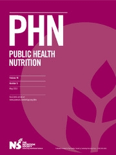
Evolution Medicine and Public Health
Scope & Guideline
Revolutionizing medicine with evolutionary perspectives.
Introduction
Aims and Scopes
- Evolutionary Mechanisms in Health and Disease:
The journal explores how evolutionary principles shape human health and disease patterns, including the adaptive significance of various physiological responses and the implications for public health. - Interdisciplinary Research:
It encourages research that combines evolutionary biology, medicine, and public health, fostering collaborations across disciplines to address complex health issues. - Application of Evolutionary Theory to Modern Medicine:
The journal emphasizes practical applications of evolutionary insights to improve clinical practices and public health strategies, including the management of diseases and health disparities. - Focus on Human and Non-Human Models:
Research often includes comparative studies between humans and non-human species, providing a broader evolutionary context to health issues. - Socioeconomic and Environmental Influences:
The journal addresses how social determinants and environmental factors interact with biological processes, influencing health outcomes and disease prevalence.
Trending and Emerging
- Integration of Evolutionary Psychology in Health:
Recent papers emphasize the role of evolutionary psychology in understanding health behaviors and attitudes, particularly in the context of disease prevention and health promotion. - Impact of Environmental Change on Health:
There is a growing trend towards exploring how environmental factors, including climate change and urbanization, affect health outcomes, reflecting an increasing recognition of the interplay between environment and evolution. - Microbiome Research and Evolutionary Perspectives:
The role of the microbiome in health and disease is gaining attention, with studies investigating how evolutionary history shapes gut microbiota and its implications for health. - Focus on Health Disparities and Inequality:
Emerging themes include the exploration of health disparities through an evolutionary lens, examining how socioeconomic factors and ancestral environments influence health outcomes across populations. - Evolutionary Insights into Infectious Diseases:
Research on the evolutionary dynamics of pathogens, including antibiotic resistance and the evolution of virulence, is increasingly prominent, reflecting urgent public health challenges.
Declining or Waning
- Traditional Biomedical Approaches:
There has been a noticeable shift away from purely biomedical perspectives that do not incorporate evolutionary insights. The journal increasingly favors research that integrates evolutionary frameworks into understanding health. - Narrowly Focused Epidemiological Studies:
Studies that focus solely on epidemiological data without connecting evolutionary implications are becoming less common, as the journal seeks broader interdisciplinary contributions. - Limited Scope on Single-Species Research:
Research that examines health issues in isolation without considering evolutionary context or comparative analyses with other species has seen a decrease. - Reductionist Approaches to Disease:
The journal appears to be moving away from reductionist approaches that focus solely on biochemical mechanisms without considering the evolutionary history and adaptive significance.
Similar Journals

Pediatrics and Neonatology
Leading the way in pediatric and neonatal advancements.Pediatrics and Neonatology is a premier open access journal published by Elsevier Taiwan, dedicated to advancing the field of child health and neonatal care. With an ISSN of 1875-9572 and an E-ISSN of 2212-1692, this journal has established itself as a notable resource for researchers, healthcare professionals, and students alike. Since its inception in 2008, it aims to share high-quality, peer-reviewed articles that cover a spectrum of topics within pediatrics, perinatology, and neonatal medicine. As of 2023, the journal holds a respectable Q2 category ranking in the field, with a Scopus rank of #136 out of 330, showcasing its relevance and contribution to the scientific community. Published in Singapore, this journal not only facilitates knowledge dissemination but also promotes collaborative research critical for improving child health outcomes globally. With open access options, the journal ensures that crucial findings are accessible to all stakeholders, enhancing the discourse in pediatric and neonatal research.

HOMO-JOURNAL OF COMPARATIVE HUMAN BIOLOGY
Advancing Knowledge in Comparative AnthropologyHOMO - Journal of Comparative Human Biology is a prestigious academic journal dedicated to advancing the field of comparative human biology, offering a platform for researchers, professionals, and students to disseminate cutting-edge findings. Published by E Schweizerbart'sche Verlagsbuchhandlung in Germany, this journal has been a crucial resource since its inception in 1950, featuring a rich archive of studies until 2023. It holds a Q3 quartile ranking in Anthropology and a Q4 quartile ranking in Miscellaneous Medicine, reflecting its significance and influence within the academic community. Although not an Open Access journal, it provides a wealth of robust research that intersects with various disciplines within the anthropological sciences. Researchers looking for a wide array of comparative studies and insights into human biology will find HOMO an invaluable addition to their scholarly resources.

JOURNAL OF EVOLUTIONARY BIOCHEMISTRY AND PHYSIOLOGY
Illuminating Evolutionary Adaptations Through Biochemical ResearchJOURNAL OF EVOLUTIONARY BIOCHEMISTRY AND PHYSIOLOGY, published by PLEIADES PUBLISHING INC, is a pivotal periodical that delves into the intricate relationships between biochemical processes and evolutionary dynamics. With its ISSN 0022-0930 and E-ISSN 1608-3202, this journal serves as a comprehensive platform for researchers, professionals, and students dedicated to understanding the physiological adaptations and biochemical mechanisms influenced by evolutionary pressures. Although it is not an open access journal, it offers valuable insights across its historically significant coverage spanning from 1972 to 2017, making it an essential resource for those working in agricultural, biological, and molecular sciences. Despite its current Scopus rankings revealing limited visibility within its fields, the journal remains committed to fostering scholarly dialogue and advancing knowledge in the realm of evolutionary biochemistry, especially for those exploring the ecological, genetic, and integrative physiological aspects of life.

Economics & Human Biology
Exploring the Synergy of Economics and Human BiologyEconomics & Human Biology, published by Elsevier, is a prestigious journal that serves as an interdisciplinary platform at the intersection of economics and health sciences. With ISSN 1570-677X and E-ISSN 1873-6130, this journal analyzes the implications of economic factors on human health and biological outcomes. As a recognized leader in its field, it has earned a remarkable Q1 ranking in both the Economics, Econometrics and Finance (miscellaneous) and Health (social science) categories for 2023, reflecting its significant impact within the academic community, as evidenced by its Scopus rank of 88 out of 371 and a 76th percentile ranking in Health social sciences. Highlighting key issues such as health disparities, economic policy impacts on health, and the biological determinants of economic behavior, the journal encourages innovative research that bridges these critical domains. Researchers, professionals, and students seeking to contribute to or stay informed on emerging trends in health economics will find this journal an invaluable resource. Explore the latest findings and engage with a community dedicated to advancing our understanding of the interplay between economics and human biology.

PUBLIC HEALTH NUTRITION
Pioneering the Future of Public Health NutritionPUBLIC HEALTH NUTRITION is a leading journal published by CAMBRIDGE UNIVERSITY PRESS, focusing on the interdisciplinary field of nutrition as it relates to public health. With its Open Access model established in 2022, the journal ensures widespread dissemination of vital research findings for practitioners, policymakers, and academics alike. Based in the United Kingdom, the journal has been pivotal in bridging gaps between nutrition science and public health initiatives since its inception in 1998. It has consistently ranked in the Q2 quartile across multiple categories, including Medicine (miscellaneous), Nutrition and Dietetics, and Public Health, Environmental and Occupational Health, as per the latest rankings. The journal is indexed in Scopus, underscoring its significance and relevance in the academic community, with impressive rankings that place it in the top percentiles of its category. Dedicated to publishing quality research that informs dietary practices and health policies, PUBLIC HEALTH NUTRITION is an essential resource for researchers, professionals, and students committed to enhancing public health through improved nutritional practices.

Gazi Medical Journal
Connecting researchers and practitioners with cutting-edge findings.Gazi Medical Journal, an esteemed publication by GALENOS PUBL HOUSE, is a prominent platform in the field of medicine, dedicated to the dissemination of innovative research and critical reviews in diverse medical disciplines. Established in 1992 and transitioning to an Open Access model in 2005, this journal aims to promote unrestricted access to valuable medical knowledge, enhancing the reach and impact of research contributions. With a growing presence in the academic community, it currently holds a Q4 quartile ranking in the category of Medicine (miscellaneous) for 2023, and it ranks at #528 out of 636 in the realm of General Medicine on Scopus, representing the 16th percentile. The journal covers a wide array of topics, making it a vital resource for researchers, healthcare professionals, and students eager to stay informed about the latest medical advancements and practices. Located in the heart of Istanbul, Turkey, Gazi Medical Journal welcomes submissions that inspire thought, spark innovation, and contribute to the ongoing discourse in the medical field.

YALE JOURNAL OF BIOLOGY AND MEDICINE
Connecting Ideas that Shape the Future of MedicineYale Journal of Biology and Medicine, established in 1945, is a distinguished peer-reviewed academic journal published by Yale J Biology Medicine, Inc. This journal serves as an essential platform for the dissemination of high-quality research in the fields of biochemistry, genetics, molecular biology, and medicine. With a notable impact factor and ranking in the top quartiles (Q2) of both biochemistry and medicine categories according to the latest metrics, it underscores its relevance and influence in the academic community. Committed to advancing understanding in these dynamic fields, the journal encourages submissions that contribute to both fundamental and applied scientific knowledge. Although it does not currently follow an open access model, the journal remains highly accessible through various academic databases. Researchers, professionals, and students are invited to explore cutting-edge findings and innovative perspectives that continue to shape the landscape of biology and medicine.

Evolutionary Bioinformatics
Exploring the dynamic landscape of evolutionary bioinformatics.Evolutionary Bioinformatics, published by SAGE Publications Ltd, is a pioneering open-access journal established in 2005, dedicated to advancing the field of evolutionary biology through innovative computational techniques and bioinformatics. With an ISSN of 1176-9343, it serves as a critical platform for researchers, professionals, and students to disseminate impactful findings and foster collaboration across disciplines. The journal spans a broad scope, contributing significantly to the areas of Ecology, Evolution, Behavior and Systematics, and Genetics, as evidenced by its respectable Scopus rankings and quartile placements in 2023. With a commitment to providing comprehensive, peer-reviewed research articles and tools for sharing knowledge, Evolutionary Bioinformatics plays an essential role in shaping the future of evolutionary studies and bioinformatics. Readers and contributors alike are encouraged to engage with cutting-edge research that pushes the boundaries of understanding in this dynamic field.

Journal of Venomous Animals and Toxins including Tropical Diseases
Decoding the Impact of Toxins on Biodiversity and HealthThe Journal of Venomous Animals and Toxins including Tropical Diseases, published by CEVAP-São Paulo State University (UNESP), is a premier open-access journal that has been disseminating vital research since its inception in 2003. This journal, holding a notable Q2 ranking in Animal Science and Zoology and Q3 rankings in Infectious Diseases, Parasitology, and Toxicology, serves as a critical platform for scholars and practitioners interested in the complex interactions between venomous animals, toxins, and tropical diseases. With an E-ISSN of 1678-9199, it offers broad accessibility to groundbreaking findings, particularly within its converged years of 2006 to 2024. By addressing pertinent issues that lie at the intersection of zoology, medicine, and environmental science, the journal aims to foster innovative research and stimulate discourse among researchers, students, and professionals committed to understanding and combating the threats posed by venomous species and their associated toxins. The journal's commitment to excellence is evidenced by its diversified metrics, including substantial rankings in Scopus, affirming its significance in the scientific community.

Adaptive Human Behavior and Physiology
Fueling Research in Human Behavioral AdaptationAdaptive Human Behavior and Physiology, published by Springer Heidelberg, is a pivotal journal in the fields of behavioral neuroscience, experimental and cognitive psychology, and physiology. With its ISSN 2198-7335, this quarterly journal serves as a forum for innovative research that explores the intricate relationships between human behavior and physiological processes. Although currently categorized within the Q4 and Q3 quartiles for various psychological and physiological domains, this journal has rapidly established itself as a significant resource for cutting-edge studies from 2015 to 2024. The journal’s commitment to high-quality research is reflected in its Scopus rankings, positioning it among noteworthy publications, particularly in experimental psychology and neuroscience. This journal is vital for researchers, professionals, and students seeking to deepen their understanding of adaptive behaviors and the underlying physiological mechanisms. Join the discourse and contribute to this evolving field through your scholarship in Adaptive Human Behavior and Physiology.